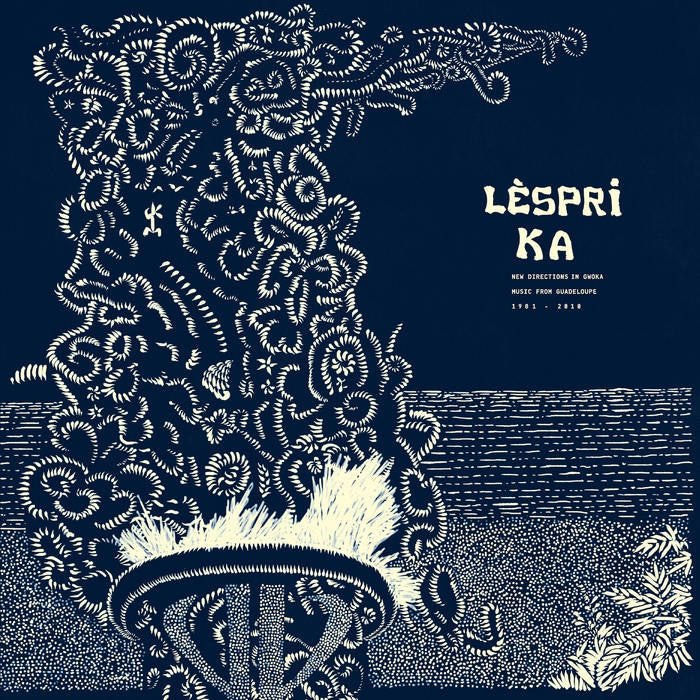Lèspri Ka - New Directions In Gwoka Music From Guadeloupe 1981-2010
Lèspri Ka - New Directions In Gwoka Music From Guadeloupe 1981-2010
The latest release from the faultless Time Capsule label focuses on the fascinating gwoka moderne scene which emerged out of Guadeloupe in the late 1970s, when local artists started to experiment and expand on the traditional gwoka music genre (the only so-called authentic Guadeloupean music). These new directions in the music resulted in some extraordinarily deep and cosmic interpretations of a genre that is rightly considered as being ‘the soul of Guadeloupe.”
All of these tracks were almost impossible to find previously and some had never been released on vinyl before. You can read about the genesis of this project on this blog post by our very own Cédric Lassonde, who co-curated the release with Séance Centre’s Brandon Hocura.
Read below an ever on point review by the legendary Dr Rob of Ban Ban Ton Ton:
There`s a theme running through Time Capsule`s recent releases. Something more than simply spotlighting superb sounds that might have been forgotten, or missed. There`s a cultural commentary going on here that catalogues something extremely prescient. Perhaps that wasn’t the label`s original intention, but in the wake of prevailing tensions, it definitely seems to have panned out that way. Previous collections from Serginho Merti, Gratien Midonet, and Mario Rui Silva – representing Brazil, Martinique, Angola, respectively – are now joined by this celebration of the music of Guadeloupe. All catalogue and document the tradition and song of countries that suffered for centuries under colonial rule, and bore the brunt of its accompanying slavery. All contain art that aims to provide support in the face of adversity, and preserve racial identity, roots. Meaning that this isn’t just groovy gear to dance to, it`s of huge historical importance.
I mean, I don’t want to get heavy here, I could quite easily sip a sunset Chocolate Milk & Brandy to half of this collection, and frug the light fantastic to the rest, but in these sides that plot the progression of modern Gwoka there is a weight in the knowledge that the vocal techniques which characterize the form were born as consequence of French king, Louis XIV`s notorious anti-black, anti-Semitic, tract, Le Code Noir. A litany of laws passed to persecute, which among many other wrongs forbade black folks from owning a drum. It was this 1685 mandate which, by necessity, gave rise to the distinctive rhythmic call-and-response – the polyphonic practice of Bouladjel – that defines Guadeloupe`s “dance of resistance, dance of life”.
For this reason voices, and flutes, largely dominate over actual percussion, over the taut beaten skins of the boula and markeur, laying down the ancestral ritual licks of the lewoz, mende, padjabel, and toumblak. Casting their spells and incantations of carnival, fertility, cane-cutting, work, and war. Wonderful woodwinds are interwoven with choral vocals, that in places verge on the operatic – recalling the sense of theatre and “community” of José Prates` Tam… Tam… Tam…! Acoustic picking, and blues-y riffing, directly descended from Malian griots, take their turn in totally uplifting arrangements, which on the surface may appear loose, but a proper deep listen reveals the incredible ensemble interplay. Each and every space filled, and each element easing into its moment in the spotlight, fluidly, pushed forward in the mix, to shine.
The sequencing from co-compilers Cedric “Beauty & The Beat” Woo and Brandon “Seance Centre” Hocura is absolutely perfect, with the set playing as if attending a live concert. The pieces moving from nursery rhyme like sing alongs, to spoken word sections, full-on tribal rumbles, and tighter song structures. The instrumentation evolving to include fusion-flavoured electric bass, keys, and synths. Sampled birdcalls, fresh water trickles and ripples, coalescing with syncopated cabasa twists and triumphant group chants. In their fearless, courageous, creole, cadence, I can trace echoes of The Last Poets` “radical”, Civil Rights raps.
Share
Couldn't load pickup availability


